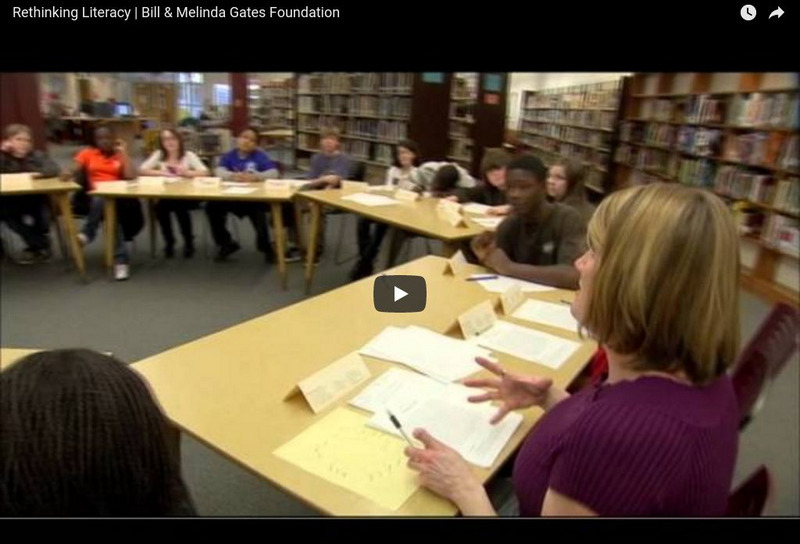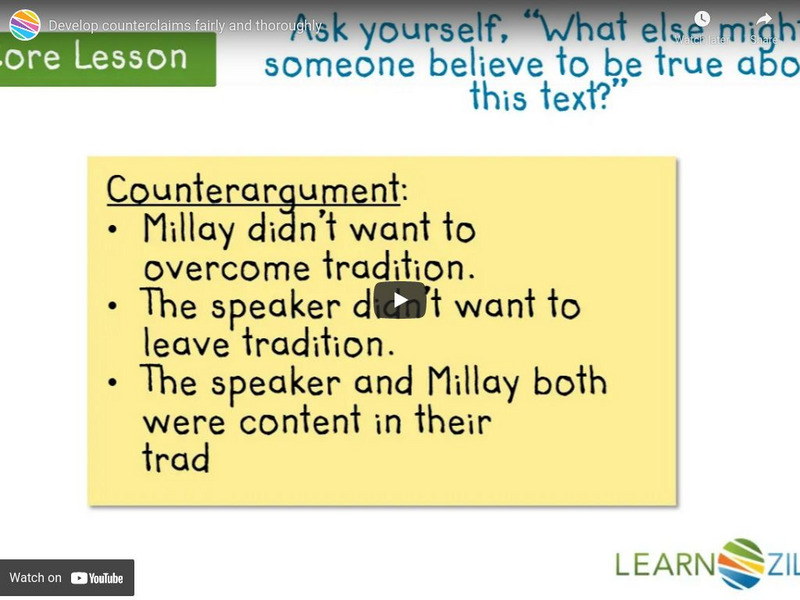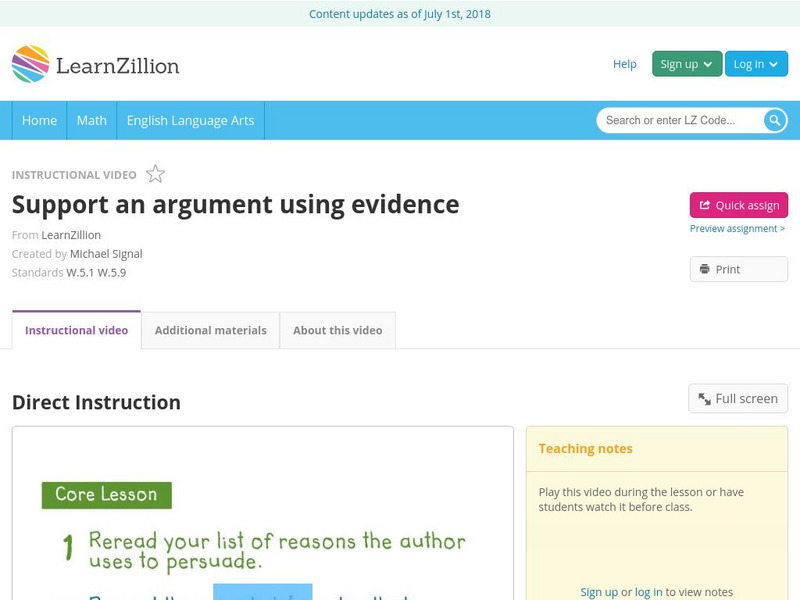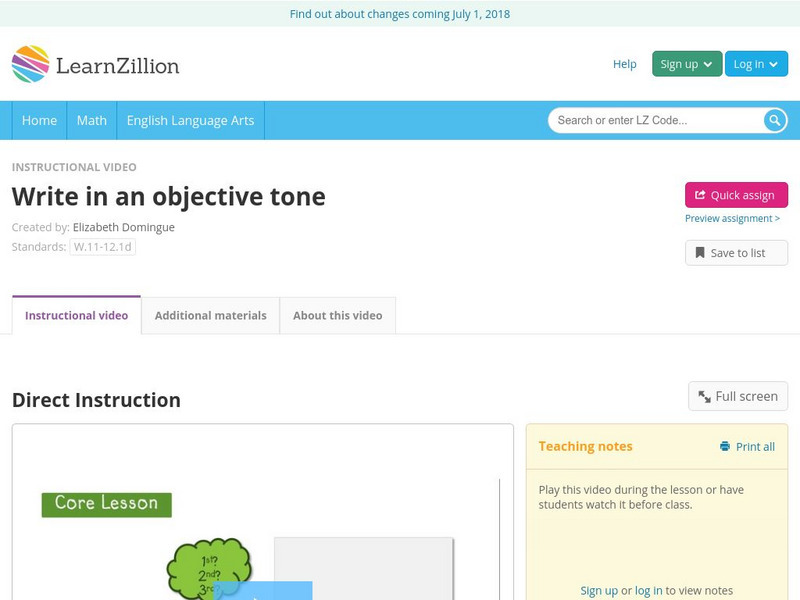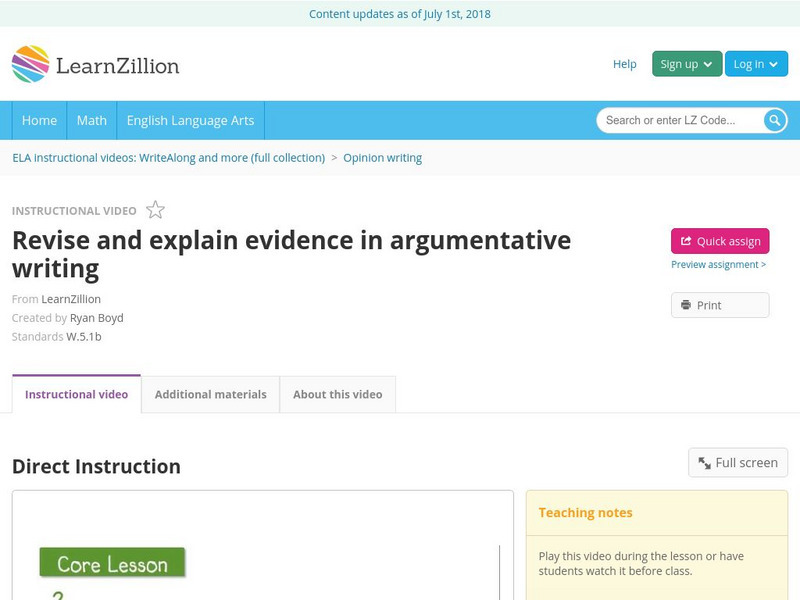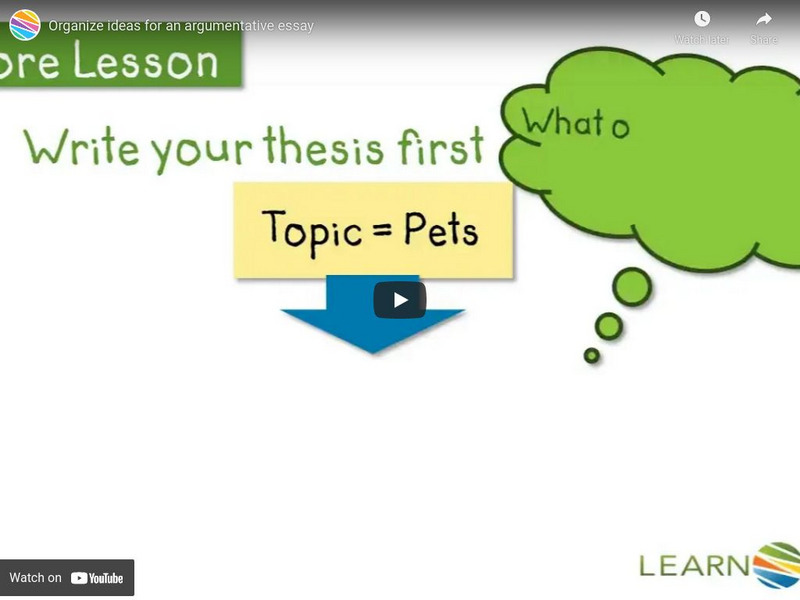Hi, what do you want to do?
Curated Video
Arguments In Writing
This video discusses informal and formal in argumentative writing.
Curated Video
Identifying Conclusions 1
"Identifying Conclusions" demonstrates how to examine concluding statements by reading passages and identifying the conclusions.
Curated Video
How to Write a Paragraph: Using Rhetorical Questions in Your Argument
Are you trying to figure out how to write a paragraph? Wondering how to use rhetorical questions in your essay? In this video, I break down how to build your argument in your paragraph using rhetorical questions. Rhetorical questions are...
Curated Video
Structuring Counterarguments and Rebuttals in Argumentative Writing
This video is a teacher's guide on how to structure counterarguments and rebuttals in argumentative writing. It explains the importance of organizing these elements logically and provides examples and practice exercises for students to...
Curated Video
Organizing Reasons Logically in Argumentative Writing
In this video, the teacher explains the importance of organizing reasons logically in argumentative writing. They introduce the concept of chronological order as one way to structure reasons and provide examples of how to apply it. The...
Curated Video
Using Relevant Evidence in Argumentative Writing
In this video, the teacher guides students through the process of ensuring that their evidence is relevant to their reasons in argumentative writing. They review the difference between a claim, a reason, and evidence, and practice...
Curated Video
Adding Quotations from Expert Sources to Strengthen Your Argument
In this video, the teacher explains the importance of using quotations and paraphrases from expert sources to strengthen argumentative writing. The teacher provides step-by-step instructions on how to incorporate quotations into body...
Curated Video
Adding Strong Evidence to Support Arguments
In this video, the teacher explains the importance of using strong and relevant evidence to support reasons in argumentative writing. The teacher provides examples and prompts for students to practice adding evidence to their writing....
Lit2Go
The Labourer and the Nightingale
Young negotiators ponder the best arguments to escape captivity after listening to Aesop's "The Labourer and the Nightingale," which tells the tale of a clever songbird who secures his own freedom. They then respond to a writing prompt...
Lit2Go
The Two Crabs
How important is it to lead with example? Part of a larger series of audiobooks, Aesop's 70-word fable "The Two Crabs" is about a mother crab that essentially tells her son to do what she says and not as she does. The writing activity...
Lit2Go
The Hart in the Ox-Stall
Take the bull by its horns with an audio retelling of Aesop's fable "The Hart in the Ox-Stall." Part of a larger set, the resource contains an audiobook recording and text passage. After listening to the story, class members then...
Lit2Go
The Fox and the Lion
Can getting to know someone change your opinion of them? After listening to Aesop's fable "The Fox and the Lion," young writers respond with a short literary analysis on the theme of familiarity.
Lit2Go
The Donkey and the Grasshopper
Patience, young grasshopper ... the lesson provides a great experience with narrative writing using an installment from a series of audiobooks of Aesop's Fables. The 57-word passage leads to an engaging activity where your readers argue...
TED-Ed
Should We Get Rid of Standardized Testing?
Did you know that the concept of standardized testing is over 2,000 years old? But what is the purpose of these tests? What do they supposedly measure? A short video investigates the history of standardized tests.
Townsend Press
Argument
Form well-crafted arguments with the help of an educational video. Fourth graders study various examples of persuasive arguments, including thesis statements and cartoons, and observe the ways that supporting details can enhance the...
Other
Educore: Rethinking Literacy Gates Foundation
This Gates Foundation video stresses the importance of literacy to student success in all content areas. It shows the Gates LDC instruction module in graphic form and in action.
Imagine Learning Classroom
Learn Zillion: Develop Counterclaims Fairly and Thoroughly
In this lesson, you will learn how to develop a counterclaim fairly and thoroughly by supplying the most relevant evidence and considering readers' knowledge and biases. [5:47]
Imagine Learning Classroom
Learn Zillion: Support an Argument Using Evidence
In this lesson, you will learn how to support an argument by finding text-based reasons that support your opinion. Login gives access to a slideshow as well. [5:52]
Imagine Learning Classroom
Learn Zillion: Write in an Objective Tone
In this lesson, you will learn to write in an objective tone by editing point of view. [5:36]
Imagine Learning Classroom
Learn Zillion: Use Anecdotes to Support an Argument
In this lesson, you will learn how to elaborate on your supporting details by using an anecdote. [5:03]
Imagine Learning Classroom
Learn Zillion: Revise and Explain Evidence in Argumentative Writing
In this lesson, you will learn how to revise your argumentative essay by telling the reader how the evidence proves your point. [4:51]
Imagine Learning Classroom
Learn Zillion: Organize Ideas for an Argumentative Essay
In this lesson, you will learn how to organize your ideas for an argumentative essay by using a short plan. [4:30]
Imagine Learning Classroom
Learn Zillion: Order Reasons and Counterargument to Best Prove Claim
Students will organize the reasons and counterargument to best prove claim. [6:42]
Imagine Learning Classroom
Learn Zillion: Develop Support for an Argument in Opinion Writing
In this lesson, you will learn how to support your argument by turning the topic sentence into a question. [4:51]













